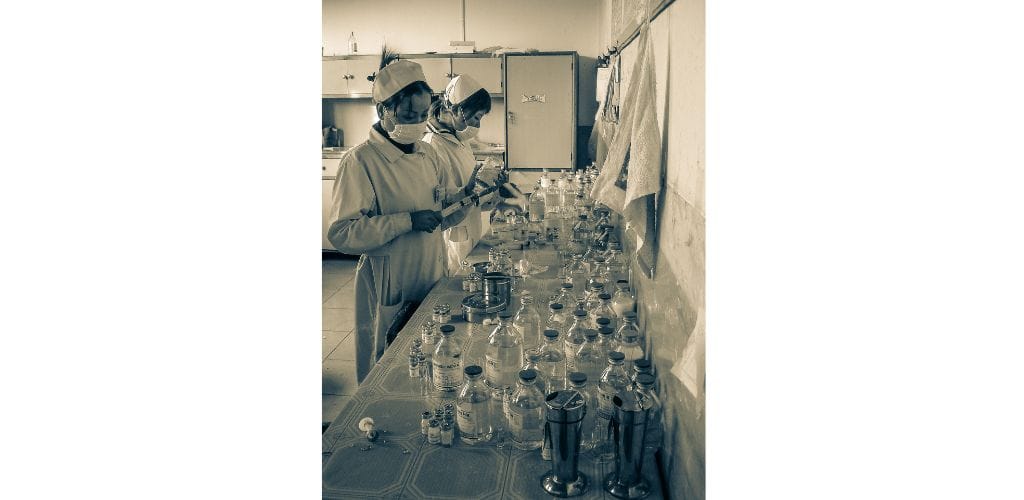The Federal Circuit has affirmed a ruling of non-infringement in a case involving a drinkable antibiotic.
The case is Azurity Pharmaceuticals, Inc. v. Alkem Laboratories Ltd.
Azurity sued Alkem for alleged infringement of claims 5, 7, 8, and 9 of U.S. Patent No. 10,959,948 following Alkem’s submission of an Abbreviated New Drug Application (ANDA).
The district court found that Alkem’s ANDA didn’t infringe any of the asserted claims of the ’948 patent.
Azurity appealed.
As the federal circuit explained,
Azurity’s ’948 patent is directed to non-sterile drinkable liquid formulations containing the antibiotic vancomycin and methods for using those formulations to treat Clostridium difficile infection…. Drinkable liquid drugs are particularly useful for treating pediatric and geriatric populations because they present a lower choking risk than capsules and, unlike injections, do not require sterilization.
Claim 5 of the ’948 patent is representative and includes the following language:
A non-sterile stable liquid formulation formulated for oral administration, consisting of:
a buffering agent, wherein the buffering agent is selected from the group consisting of citric acid, sodium citrate, sodium tartarate, sodium acetate, sodium carbonate, …vancomycin hydrochloride, and flavoring agent…
(Emphasis added by court.)
The court noted that the application for the ’948 patent was a continuation of another application which had been rejected several times by the examiner over a prior art reference known as Palepu.
Palepu discloses an intravenously administered liquid formulation containing vancomycin used to treat Clostridium difficile with “a polar solvent including propylene glycol.”
The district court determined that Azurity “clearly and unmistakably” disclaimed propylene glycol from the invention claimed in the ’948 patent.
The district court found that Alkem’s ANDA product undisputedly contains propylene glycol, and accordingly ruled that Alkem’s ANDA product did not infringe the ’948 patent because the asserted claims used the closed “consisting of” transition.
The parties had stipulated at trial that “[s]uitable flavoring agents for use in the Asserted Claims include flavoring agents with or without propylene glycol.”
Azurity interpreted the stipulation to mean that products with flavoring agents that include propylene glycol could infringe the ’948 patent regardless of the “consisting of” transition and any purported disclaimer.
The district court found that Azurity’s interpretation of the stipulation was “unpersuasive,” and that the disclaimer of propylene glycol was still dispositive.
The federal circuit noted that in 2019, Azurity proposed several draft amendments and new claims in preparation for an interview with the patent examiner.
These included the following negative limitations:
- wherein the oral liquid solution does not comprise a propylene glycol
- wherein the liquid solution does not comprise a suspending agent, and
- wherein the liquid solution does not comprise a propylene glycol.
(Emphasis added.)
Azurity then amended claims to include a negative limitation excluding propylene glycol.
For other claims, Azurity introduced the close-ended transition phrase “consisting of.”
Azurity argued that “[t]he absence of propylene glycol and polyethylene glycol in the claimed invention, in part, distinguish it from [Palepu].”
An issue on appeal was whether Azurity clearly and unmistakably disclaimed propylene glycol. The federal circuit held that it did.
The court noted that
Azurity added “consisting of” to the preambles of claims 20 and 24. The “consisting of” transition is closed. With little exception, it limits the claim’s scope to the recited components.
The court cited the principle that:
‘Consisting of’ is a term of patent convention meaning that the claimed invention contains only what is expressly set forth in the claim.
(Emphasis added.)
Also, noted the court,
‘[C]losed’ transition phrases such as ‘consisting of’ are understood to exclude any elements, steps, or ingredients not specified in the claim.
Thus, the court concluded that Azurity’s disclaimer of propylene glycol in the claims of the ’948 patent was “clear, unambiguous, and complete.”
Just like the haiku above, we like to keep our posts short and sweet. Hopefully, you found this bite-sized information helpful. If you would like more information, please do not hesitate to contact us here: https://aeonlaw.com/contact-us/.


